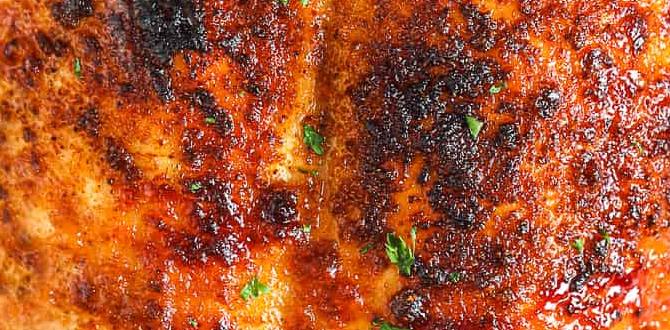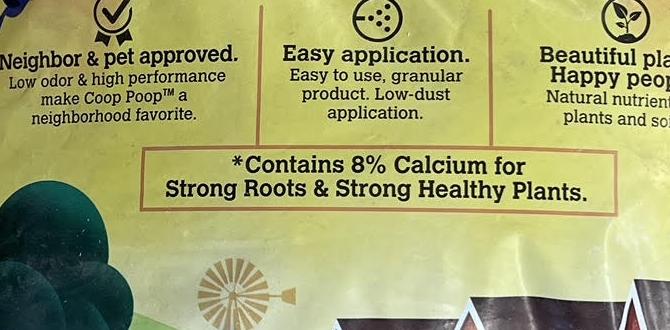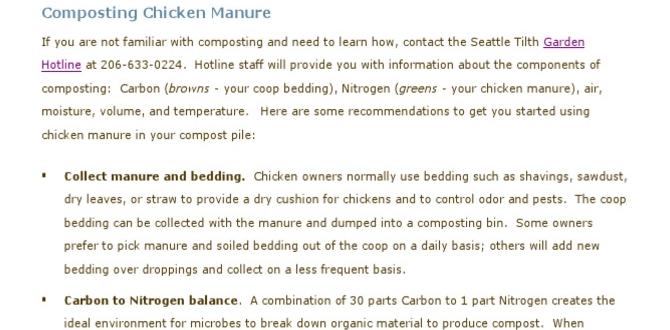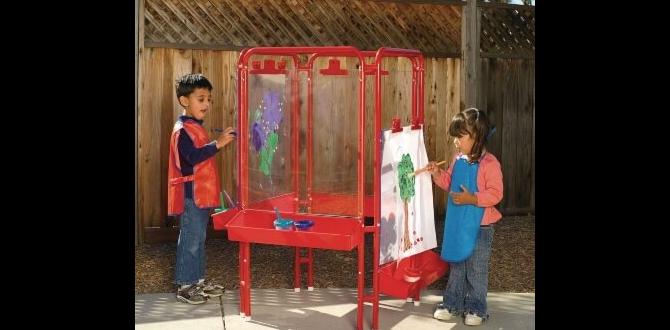Have you ever wondered what makes a garden thrive? Many gardeners look for the best ways to nourish their plants. One surprising answer might come from a farm. Yes, chicken poop can be good for gardens!
Imagine your plants growing big and strong. What if I told you chicken waste might help with that? It sounds a bit messy, but it can be a hidden treasure for soil health.
In fact, chicken poop is rich in nutrients. These nutrients are great for plants because they help them grow. But how can you use it safely? Let’s discover if using chicken poop truly benefits your garden!
Is Chicken Poop Good For Gardens? Benefits And Uses Explained

Is Chicken Poop Good for Gardens?
Chicken poop can be a gardener’s secret weapon! It’s rich in nutrients like nitrogen, which helps plants grow strong. However, it’s important to use it wisely. Fresh chicken poop can burn plants, so compost it first. Did you know that many farmers swear by using chicken litter to boost crop yields? It’s also a natural fertilizer that enhances soil health. With proper handling, chicken poop can help gardens flourish, making you a proud gardener!Understanding Chicken Manure
Composition of chicken manure: nutrients and organic materials. Different types of chicken manure and their properties.
Chicken manure is rich in nutrients and organic material. It contains vital elements like nitrogen, phosphorus, and potassium, which plants need to grow strong. There are different types of chicken manure: fresh, composted, and dried. Each type has unique properties that can benefit your garden.
| Type of Manure | Properties |
|---|---|
| Fresh | High in nutrients but can burn plants |
| Composted | Safe for plants; improves soil health |
| Dried | Convenient; easy to store and apply |
Why is chicken manure beneficial?
Chicken manure improves soil fertility. It adds nutrients and helps retain moisture. Healthy soil leads to better plant health, which results in bountiful harvests.
Benefits of Using Chicken Poop in Gardens
Nutritional benefits for plants: nitrogen, phosphorus, potassium. Soil structure improvement and microbial activity enhancement.
Using chicken poop in your garden comes with a basketful of benefits! This “golden fertilizer” is rich in nitrogen, phosphorus, and potassium. These nutrients help plants grow strong and healthy! Plus, it improves soil structure, making it fluffier and easier for roots to dig deep. With chickens on duty, microbial activity in the soil buzzes like a bee at a flower party. In simpler terms, chicken poop feeds plants and keeps the soil happy!
| Nutrient | Benefit |
|---|---|
| Nitrogen | Boosts plant growth |
| Phosphorus | Helps flowers and fruits |
| Potassium | Strengthens plant cells |
So next time you see chicken poop, don’t think “yuck!” Instead, remember it’s a gardener’s secret weapon!
How to Properly Use Chicken Manure in Gardens
Methods of application: fresh vs. composted manure. Recommended application rates and timing for optimal results.Using chicken manure in your garden can be a game-changer! Fresh manure is rich in nutrients but can burn plants if used directly. So, compost it to soften the effect and create a nutrient-rich treasure. Apply it at about 1-2 pounds per square foot during spring or fall for the best results. Mix it well into the soil; your plants will thank you by growing big and strong, maybe even flexing their little leaves! Here’s a quick look at the methods:
| Type | Usage Method | Recommended Rate |
|---|---|---|
| Fresh Manure | Compost before use | 1 lb/sq ft |
| Composted Manure | Mix into soil | 2 lb/sq ft |
Remember, timing is key! Apply composted manure at least a month before planting for amazing results. Happy gardening!
Potential Drawbacks of Chicken Manure
Risks of pathogens and contaminants in fresh manure. Overfertilization and its effects on plants and soil.Fresh chicken manure can be risky for gardens. It may carry pathogens and contaminants that can harm plants and humans. Using it without proper treatment increases these risks. Moreover, using too much chicken manure leads to overfertilization. This can cause plants to grow poorly and may even harm the soil. Balance is key in gardening!
Are there health risks with chicken manure?
Yes, there can be health risks. Chicken manure may contain harmful germs. Handling it without care could lead to sickness.
Possible risks include:
- Spread of diseases
- Soil contamination
Comparing Chicken Manure to Other Fertilizers
Advantages and disadvantages vs. chemical fertilizers. How chicken manure stacks up against other animal manures.
Using chicken manure has some great points. It is rich in nutrients like nitrogen, phosphorus, and potassium, which are vital for plant growth. Compared to chemical fertilizers, chicken manure is natural and safe for the environment. However, it can be too strong if used incorrectly and may contain pathogens.
When we compare chicken manure to other animal manures, it often stands out due to its high nutrient content. Here’s how it matches up:
- Chicken Manure: High in nutrients, improves soil structure.
- Cow Manure: Milder, but requires composting.
- Horse Manure: Good for soil, but can have weed seeds.
In summary, chicken manure is an excellent choice for gardeners, giving plants a nutritious boost without harsh chemicals.
Is chicken poop good for gardens?
Yes, chicken poop is good for gardens. It enriches the soil and helps plants grow better when used properly.
Best Practices for Integrating Chicken Poop into Your Gardening Routine
Tips for composting chicken manure effectively. Companion planting techniques that benefit from chicken manure use.Composting chicken manure helps create rich soil for your garden. Here are some tips:
- Mix chicken poop with browns, like dried leaves. This balances nutrients.
- Turn the compost regularly. This adds air and speeds up the breakdown.
- Use materials like grass clippings and kitchen scraps for healthy compost.
When using chicken manure, companion planting can help:
- Plant tomatoes with basil. They thrive together with chicken manure.
- Grow corn near beans. Beans fix nitrogen, improving soil health.
- Pair carrots with onions. They deter pests and enjoy nutrients together.
Why should I compost chicken manure?
Composting chicken manure prevents bad odors and harmful bacteria. It enriches your soil and helps plants grow strong. Healthy compost improves water retention and drainage.
Environmental Impact of Using Chicken Manure
Sustainable agriculture practices and waste recycling. Effects on soil health and biodiversity in gardens.
Using chicken manure is like having a garden superhero! It helps the environment by recycling waste. Instead of throwing away chicken droppings, we can use them to enrich soil and promote sustainable gardening practices. Poultry waste improves soil health by adding nutrients and supports biodiversity, making plants stronger and gardens more lively. Plants love it, and so do the earthworms—who wouldn’t want happy worms in their dirt party?
| Benefit | Effect |
|---|---|
| Nutrients | Boosts plant growth |
| Soil Structure | Improves drainage and aeration |
| Biodiversity | Attracts beneficial insects |
Frequently Asked Questions About Chicken Manure
Common concerns and misconceptions. Expert advice on using chicken manure safely and effectively.Many wonder if chicken manure is safe for gardens. One big concern is its smell. While chicken poop can have a unique aroma—like a farm in summer—it’s actually a treasure for plants. Properly composted chicken manure offers nutrients without the stench. Experts say, “Use it wisely, and your plants will thank you!” For effective use, check out this helpful table:
| Tip | Description |
|---|---|
| Compost First | Always compost chicken poop before applying it to your garden to decrease odor. |
| Timing Matters | Apply it in the fall or early spring for the best results. |
| Watch the Quantity | Too much can harm your plants; a little goes a long way! |
So, with some basic know-how and a good laugh about the smells, chicken poop could be your garden’s best buddy!
Conclusion
In conclusion, chicken poop can be great for your garden. It adds nutrients and helps plants grow strong. Just remember to compost it first to avoid burning plants. If you want your garden to thrive, try using chicken manure wisely. You can learn more about composting or using animal waste in gardening with some fun online research. Happy gardening!FAQs
What Are The Benefits Of Using Chicken Manure As Fertilizer In Gardens?Using chicken manure as fertilizer is great for gardens. It helps plants grow big and strong because it has lots of nutrients. Chicken manure also improves the soil, making it better at holding water. Plus, it’s a natural way to recycle waste from chickens. So, using it can make your garden healthier and more productive!
How Should Chicken Poop Be Processed Or Prepared Before Applying It To Garden Soil?Before using chicken poop in the garden, you should compost it. Composting helps break it down and makes it safe. Mix it with dry leaves or straw to help it rot faster. Let it sit for a few months. Then, you can spread it on your soil to help your plants grow strong!
Are There Any Risks Or Downsides To Using Chicken Manure In Vegetable Gardens?Yes, there are some risks to using chicken manure in vegetable gardens. It can contain germs that might make us sick. If we don’t use it properly, it can burn plants because it’s very strong. We should always compost it first to make it safe. This way, we can grow healthy vegetables without worries!
How Does Chicken Poop Compare To Other Types Of Animal Manure In Terms Of Nutrient Content?Chicken poop is really rich in nutrients. It has lots of nitrogen, phosphorus, and potassium, which are good for plants. Compared to cow or horse poop, chicken poop usually has more nutrients in a smaller amount. This makes it a great fertilizer for gardens. Just remember to use it carefully so it doesn’t hurt the plants!
What Is The Best Way To Apply Chicken Manure To Ensure It Is Safe And Effective For Garden Use?To use chicken manure safely in your garden, first, let it compost for a few weeks. This means letting it sit so it breaks down and becomes safer. Then, spread a thin layer on your garden soil. Make sure you mix it well into the dirt. Always wash your hands after handling it to stay clean and healthy!
{“@context”:”https://schema.org”,”@type”: “FAQPage”,”mainEntity”:[{“@type”: “Question”,”name”: “What Are The Benefits Of Using Chicken Manure As Fertilizer In Gardens? “,”acceptedAnswer”: {“@type”: “Answer”,”text”: “Using chicken manure as fertilizer is great for gardens. It helps plants grow big and strong because it has lots of nutrients. Chicken manure also improves the soil, making it better at holding water. Plus, it’s a natural way to recycle waste from chickens. So, using it can make your garden healthier and more productive!”}},{“@type”: “Question”,”name”: “How Should Chicken Poop Be Processed Or Prepared Before Applying It To Garden Soil? “,”acceptedAnswer”: {“@type”: “Answer”,”text”: “Before using chicken poop in the garden, you should compost it. Composting helps break it down and makes it safe. Mix it with dry leaves or straw to help it rot faster. Let it sit for a few months. Then, you can spread it on your soil to help your plants grow strong!”}},{“@type”: “Question”,”name”: “Are There Any Risks Or Downsides To Using Chicken Manure In Vegetable Gardens? “,”acceptedAnswer”: {“@type”: “Answer”,”text”: “Yes, there are some risks to using chicken manure in vegetable gardens. It can contain germs that might make us sick. If we don’t use it properly, it can burn plants because it’s very strong. We should always compost it first to make it safe. This way, we can grow healthy vegetables without worries!”}},{“@type”: “Question”,”name”: “How Does Chicken Poop Compare To Other Types Of Animal Manure In Terms Of Nutrient Content? “,”acceptedAnswer”: {“@type”: “Answer”,”text”: “Chicken poop is really rich in nutrients. It has lots of nitrogen, phosphorus, and potassium, which are good for plants. Compared to cow or horse poop, chicken poop usually has more nutrients in a smaller amount. This makes it a great fertilizer for gardens. Just remember to use it carefully so it doesn’t hurt the plants!”}},{“@type”: “Question”,”name”: “What Is The Best Way To Apply Chicken Manure To Ensure It Is Safe And Effective For Garden Use? “,”acceptedAnswer”: {“@type”: “Answer”,”text”: “To use chicken manure safely in your garden, first, let it compost for a few weeks. This means letting it sit so it breaks down and becomes safer. Then, spread a thin layer on your garden soil. Make sure you mix it well into the dirt. Always wash your hands after handling it to stay clean and healthy!”}}]}






